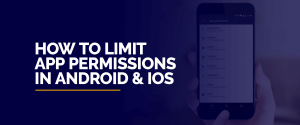

Get 93% OFF on Lifetime
Exclusive Deal
Don’t miss out this deal, it comes with Password Manager FREE of cost.
Get 93% off on FastestVPN and avail PassHulk Password Manager FREE
Get This Deal Now!By Johan Curtis No Comments 6 minutes
Ever since the era of smartphones began, there was a rapid increase in the use of applications. We probably use several different apps on the daily; the first thing a person does when they wake up is to grab their phone to check their notifications. You either see who messaged you on WhatsApp or your Facebook and Instagram notifications.

These notifications are sent you to by different applications once you have granted them the access to send you to push notifications. Similarly, when you download a new application, upon launching the app for the first time, it asks for a lot of permissions to function predictably.
For example, Google Maps requires that you allow it to access your location at all times to improve location accuracy and provide better and more relevant routes.
Application permissions are how your software controls and processes a device’s functions.
Typically, there are several types of permissions which include many functions such as the permission to access the particular device’s hardware or the user’s personal information such as contacts, photos etc. You must have noticed that when you first create a WhatsApp account, it asks you if it can access your contacts to make syncing contacts easier when you want to send a photo. It’ll also ask you if it can access your camera roll.
There are several different types or forms of application permissions that you may come across in your day to day life. Here are a few:
Normally, applications asking for permission to access various sections of our device seems fairly harmless. I’m pretty sure that most don’t even pay much attention to it. Although, there is one thing that you should consider before granting any app permissions. You need to know that by consenting access, you are revealing private information to the developers of those applications.
These apps keep running in the background even after you close them. This means that they constantly have access to all the things you have allowed. It could vary from your microphone, camera, gallery, etc.
Facebook was caught listening in on your conversations through your microphone to keep track and record your preferences. It’s probably to display more relevant advertisements and make your browsing experience more accurate.
It is only one example of such actions taken by applications. It is quite concerning because the thought of someone having access to your private information is extremely disturbing. It’s a violation of your privacy!
Similarly, you must pay close attention to what permission an application is asking for and how relevant they are to that particular app. For example, a location application asking to access your camera roll is quite odd or a flashlight app asking access to the microphone or contacts. It shouldn’t be permitted to do so because it could be a potential hacker trying to commit fraud.
Many non-verified applications or smaller apps are made by such criminals who have installed malicious software to track and record the user’s data once they grant permission. This is why you need to pay attention to what an app is asking to access, and if it seems odd in any way, you must not permit it access.
Permitting applications access to just about anything can be extremely harmful to you and pose as a security threat. Some apps could keep tabs on your info and then forward it to third parties, who could then misuse your information. Similarly, hackers could easily get a hold of all the data on your smartphone and compromise your wellbeing.
It is fairly easy for you to limit the number of app permissions on your device to ensure your safety and protect your information at all costs.
Here’s how you can limit your app permissions for a specific app if you own an Android:
If you want to get a more general view of which parts are being accessed by the installed apps:
Moreover, here’s how you can limit app permissions on your iOS device:
App permissions may come in handy for user experience while on the app. However, it must be acknowledged that granting permission for everything to just any application is not safe at all; and one must be extra cautious before choosing to do so.
It is imperative to take a few extra precautionary measures to keep your private data secure while you surf apps.
© Copyright 2024 Fastest VPN - All Rights Reserved.


Don’t miss out this deal, it comes with Password Manager FREE of cost.
This website uses cookies so that we can provide you with the best user experience possible. Cookie information is stored in your browser and performs functions such as recognising you when you return to our website and helping our team to understand which sections of the website you find most interesting and useful.
Strictly Necessary Cookie should be enabled at all times so that we can save your preferences for cookie settings.
If you disable this cookie, we will not be able to save your preferences. This means that every time you visit this website you will need to enable or disable cookies again.


